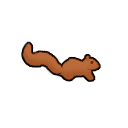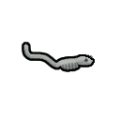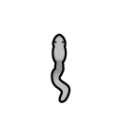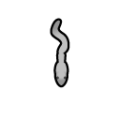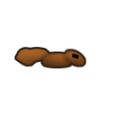Squirrel
Squirrel
One of the many hardy rodent species that follows humankind everywhere it spreads. Squirrels are distinguished by their bushy tails, which they use as umbrellas in bad weather.
Base Stats
- Type
- Animal
- Flammability
- 70%
Pawn Stats
- Combat Power
- 33
- Move Speed
- 5.1 c/s
- Health Scale
- 25% HP
- Body Size
- 0.2
- Mass - Baby
- 2.4 kg
- Mass - Juvenile
- 6 kg
- Mass - Adult
- 12 kg
- Carrying Capacity
- 15
- Filth Rate
- 1
- Hunger Rate
- 0.16 Nutrition/Day
- Diet
- herbivorous
- Life Expectancy
- 8 years
- Coastal Animal
- false
- Manhunter Chance
- 0%
- Manhunter Chance (Taming)
- 0%
- Trainable Intelligence
- None
- Wildness
- 75%
- Minimum Handling Skill
- 8
- Mate Interval
- 12 hours
- Maturity Age
- 0.222 years (13.3 days)
- Juvenile Age
- 0.11 years (6.6 days)
- Toxic Resistance
- 50%
- Toxic Environment Resistance
- 0%
- Comfortable Temp Range
- -35 °C – 40 °C (-31 °F – 104 °F)
Production
- Meat Yield
 31 squirrel meat
31 squirrel meat- Leather Yield
 16 lightleather
16 lightleather- Gestation Period
- 5.661 days
- Offspring Per Birth
- 1-2 (1.444 avg)
Melee Combat
- Attack 1
- Front left paw
4 dmg (Scratch)
6 % AP
2 second cooldown - Attack 2
- Front right paw
4 dmg (Scratch)
6 % AP
2 second cooldown - Attack 3
- Teeth
5 dmg (Bite)
7 % AP
2 second cooldown
0.7 chance factor - Attack 4
- Head
2 dmg (Blunt)
3 % AP
2 second cooldown
0.2 chance factor - Average DPS
- 1.3206
- tradeTags
- AnimalCommon
Squirrels are one of the smallest and generally mostly harmless animals on rimworlds. Storytellers often make this the target of your first maddened animal encounter, sending it to attack your colonists.
Acquisition[edit]
Squirrels can be found in temperate forests, temperate swamps, boreal forests, cold bogs, glacial plains![]() , and grasslands
, and grasslands![]() . They can either be tamed by a handler or self-tame in a random event.
. They can either be tamed by a handler or self-tame in a random event.
Analysis[edit]
With very low health and a low melee damage, one might think this critter to be harmless. But due to its fast speed and very fast attack rate, your colonists may suffer many bleeding wounds very quickly, adding up to a potentially lethal threat. Their small size makes them hard to shoot, and a large group of squirrels turned manhunter can be especially dangerous.
Otherwise, squirrels offer a tiny amount of food when hunted, equal to that of the rat. They have no particular use as tamed animals, not valuable for meat. Even as "bait" animals, rats and hares are better at the task. Hares are faster and just as difficult to tame, while rats are omnivores and easier to tame. Both can be found in all biomes that squirrels reside in.
Training[edit]
This animal can be trained as follows:
| | |
| | |
| | |
| |
*As of version 1.1.2610, all animals can be tamed. The percentage of likelihood of success depends on factors such as the Animals Wildness Percentage, Pawn Handling Skill, and others. More information can be found on the animals page.
Health[edit]
The body part table is collapsed due to length. Expand to view.
| Part Name | Health | Quantity | Coverage[1] | Target Chance[2] | Subpart of | Internal | Capacity[3] | Effect if Destroyed/Removed |
|---|---|---|---|---|---|---|---|---|
| Body | 10 | 1 | 100% | 21% | N/A[4] | - | Death | |
| Tail | 2.5 | 1 | 7% | 7% | Body | - | - | |
| Spine | 6.25 | 1 | 3% | 3% | Body | Moving |
−100% Moving[5] | |
| Stomach | 5 | 1 | 3% | 3% | Body | Digestion |
−50% Digestion | |
| Heart | 3.75 | 1 | 3% | 3% | Body | Blood Pumping |
Death | |
| Lung | 3.75 | 2 | 3% | 3% | Body | Breathing |
−50% Breathing. Death if both lost. | |
| Kidney | 3.75 | 2 | 3% | 3% | Body | Blood Filtration | −50% Blood Filtration. Death if both lost. | |
| Liver | 5 | 1 | 3% | 3% | Body | Digestion |
Death | |
| Neck | 6.25 | 1 | 20% | 5% | Body | Eating Talking Breathing |
Death | |
| Head | 6.25 | 1 | 75% | 2.25% | Neck | - | Death | |
| Skull | 6.25 | 1 | 25% | 1.125% | Head | - | Cannot be destroyed Increasing Pain based on damage. | |
| Brain | 2.5 | 1 | 70% | 2.625% | Skull | Consciousness |
Death Damage always results in scarring. | |
| Eye | 2.5 | 2 | 12% | 1.8% | Head | Sight |
−25% Sight. −100% if both lost. Damage always results in scarring. 0% Hit Chance against Blunt damage. | |
| Ear | 3 | 2 | 8% | 1.2% | Head | Hearing |
−25% Hearing. −100% if both lost. | |
| Nose | 2.5 | 1 | 10% | 1.5% | Head | - | - | |
| AnimalJaw | 2.5 | 1 | 10% | 1.5% | Head | Manipulation |
−100% Manipulation. Can no longer use Bite attack. | |
| Front Leg | 7.5 | 2 | 7% | 5.95% | Body | Moving |
−25% Moving. −50% if both lost. Can no longer use paw attack.[6] | |
| Front Paw | 2.5 | 2 | 15% | 1.05% | Front Leg | Moving |
−25% Moving. −50% if both lost. Can no longer use paw attack. | |
| Rear Leg | 7.5 | 2 | 7% | 5.95% | Body | Moving |
−25% Moving. −50% if both lost. | |
| Rear Paw | 2.5 | 2 | 15% | 1.05% | Rear Leg | Moving |
−25% Moving. −50% if both lost. |
- ↑ Coverage determines the chance to hit this body part. It refers to the percentage of the super-part that this part covers, before its own sub-parts claim their own percentage. For example, if the base coverage of the super-part is 100%, and the coverage of the part is 20%, 20% of hits would hit the part, and 80% the super-part. If the part had its own sub-part with 50% coverage, the chances would be 10% sub-part, 10% part, 80% super part.
- ↑ Target Chance is the actual chance for each part to be be selected as the target when each part's coverage has been taken into account(I.E. Neck covers 7.5% of Torso but Head covers 80% of Neck so it actually has only a 1.5% chance to be selected). This is not pure hit chance, as different damage types propagate damage in different ways. See that page for details.
- ↑ Note that capacities can affect other capacities in turn. Only the primary effect is listed. See specific pages for details.
- ↑ This is the part that everything else connects to to be considered 'connected'.
- ↑ If Moving drops below 16% a pawn cannot move.
- ↑ A Scratch attack that varies from animal to animal. Each front paw allows one attack.
Attack table
| Attack (Damage type) |
DPS[1] (Post Hit Chance)[2] |
Dam. | Cool. | AP | Selection chance[3] | |
|---|---|---|---|---|---|---|
| Average | 2.13 (1.32) |
- | - | 6.25% | - | |
| Front left paw (Scratch) |
2 (1.24) |
4 | 2s | 6% | 37.5% | |
| Front right paw (Scratch) |
2 (1.24) |
4 | 2s | 6% | 37.5% | |
| Teeth (Bite) |
2.5 (1.55) |
5 | 2s | 7% | 25% | |
| Head (Blunt) |
1 (0.62) |
2 | 2s | 3% | 0% | |
- ↑ Note: This is the actual base average derived from the melee verb system updated in 1.1.2610, it may sometimes disagree with the listed value in the in-game infobox.
It may also change depending on the stats and the melee verbs available to the pawn. - ↑ Assuming a melee hit chance of 62%
- ↑ Chance for attack to be selected. It may change depending on the melee verbs available to the pawn.
Gallery[edit]
Version history[edit]
- 0.12.906 - Sprite changed.
- 1.5.4062 - Fix: Dessicated squirrel corpses have north/south graphics flipped.
- 1.6.4518 - Fix: Squirrels missing eating sound.
